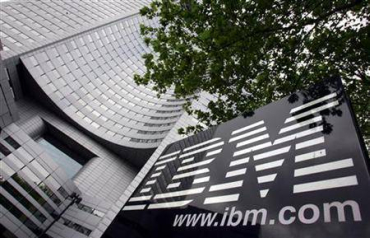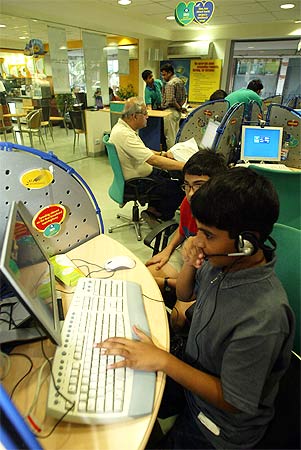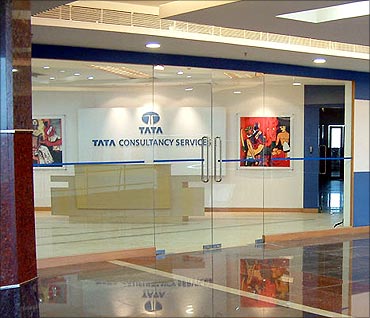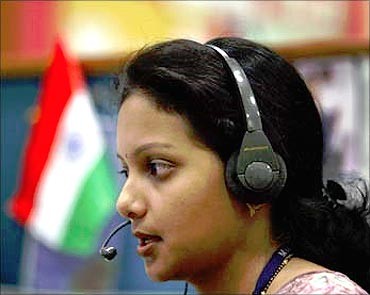Photographs: Reuters Preeti Khicha in Bengaluru
Are you willing to provide me with more value-added services so that we can work as partners, rather than deploy five employees who can churn out 10 lines of code at the cheapest rate?
This is the new language that clients of the Indian information technology companies are beginning to speak, leading them to change the way they conduct their businesses.
Indian IT bigwigs are at an interesting intersection. Cost arbitrage, which has been the model on which these behemoths built their businesses, is no longer the only trump card to success.
Granted, as an industry IT has played a key role in putting India on the global economic map; now the question uppermost on the industry leaders' minds is how to move away from linearity -- where growth is inextricably linked to the number of people or man-hours -- to a more non-linear model which thrives on improving productivity and institutionalising their innovation.
What is challenging the status quo? The biggest challenge is that as the wave of globalisation spreads, global consulting companies like IBM, HP and Accenture have been able to replicate the delivery model of their Indian counterparts, leading to the business becoming commoditised.
They have set up 'offshore' centres in India, encroaching into what was once the domain of the Indian IT companies.
. . .
Embattled Indian IT firms adopt NEW growth strategies
Photographs: Reuters
"The IBMs and Accentures already had a strong front end, so going back-end was not difficult for them. All you needed was low cost people, whereas the technology and brand was already there," says an analyst at BNP Paribas who wishes to stay anonymous.
The other challenge is managing a huge task force. If IT services companies have to maintain the current levels of growth in the future, employee growth will need to explode.
The top four cumulatively employ about 0.5 million people: TCS about 2 lakh (200,000), Infosys upwards of 1.3 lakh (130,000), 1.2 lakh (120,000) from Wipro and 75,000 from HCL Technologies.
But, ever wondered about the challenges of managing an increasingly large employee base? Rising wage costs, large capital expenditure on infrastructure for employees, the lack of skills are just a few of the woes of mass hiring.
"With the linear design, costs also continue to spiral. As the industry matures, pricing needs to be constant. So unless you create hyper-productivity through the creation of intellectual property or differentiated skills, methods and frameworks, margins will be squeezed, which will eventually impact the profitability," says Sanjay Purohit, senior vice-president, global head of products, platforms and solutions, Infosys.
If you go by numbers, non-linearity is still a while away.
. . .
Embattled Indian IT firms adopt NEW growth strategies
Photographs: Reuters
The top four IT majors, TCS, Infosys, Wipro and HCL Tech, clocked 22.4 per cent, 24.9 per cent, 25.2 per cent and 29.2 per cent CAGR respectively (in dollar revenue) between FY 2005 and 2011, whereas headcount CAGR for these four companies over the same period has been 27.7 per cent, 23.6 per cent, 19.6 per cent and 20.8 per cent respectively, implying no major improvement in productivity per employee.
But IT services companies are looking at ways to change and are exploring newer models to help them make the leap.
For top tier IT companies like Infosys, Wipro, HCL and TCS, already 8-10 per cent of the revenues come from non-linear initiatives. The target now is to scale this up to a quarter of revenues in the next couple of years.
Take the example of Infosys, the second largest IT services company by revenue, where work began almost two years ago. Purohit believes to create non-linearity, it has to work on a number of areas.
One of the areas is pricing, where one has to move away from time and material pricing to transaction-based pricing.
So Infosys is working on different types of pricing, from fixed-price pricing which is the most primitive form of non-linearity to transaction and outcome-based pricing, where clients are charged based on tangible business outcomes like revenue growth and market share, irrespective of employee strength.
. . .
Embattled Indian IT firms adopt NEW growth strategies
Photographs: Reuters
"We are training our sales force to sell the new pricing models with our customers. This requires a lot of confidence building," explains Purohit.
According a report by JP Morgan India, Infosys has already converted 40 per cent of its existing client base to embrace new engagement models, contributing 6 per cent to revenues.
This will have to increase to 25 per cent to maintain the overall margins, but require deal sizes to get much larger.
Companies like TCS, and HCL Tech are increasingly looking to experiment with new pricing models other than traditional effort-based models (US$/hour billing), says a June 2011 report by Nirmal Bang Securities.
At mid-tier IT services firms like iGate Patni too, the change in pricing models is underway. After US-based iGATE acquired Patni Computers, the company is moving towards an outcome-based pricing structure. The company is targeting 30 per cent of the revenues to come from the new pricing structure by 2017.
Moving away from the time and material based pricing is critical. "If you are using productivity as a lever for non-linear growth, as people get more efficient you cannot get a higher rate for them in the effort-based model," says Rajiv Sodhi, senior corporate vice president and chief customer officer, HCL Technologies.
. . .
Embattled Indian IT firms adopt NEW growth strategies
Photographs: Reuters
Sodhi says a large section of mature customers would like to opt for this pricing model -- they would rather pay for the scope of work than the number of hours put in. But to move away from time and material pricing, scope of offering needs to be broadened.
Building products and platforms is another way in which companies are broadening their offerings.
At Infosys, developing products and platforms is a strategic thrust area which got a renewed focus when the company unveiled the Infosys 3.0 vision a few months ago.
Under Infosys 3.0, the target will be to achieve equal revenue from three streams -- consulting and systems integration, platforms and solutions, and business IT services.
The products and platform development strategy at Infosys will have four legs.
"The first is to incubate through in-house research and development. Second, co-create with customers and use products and platforms across the market. Third, explore partnerships to develop platforms like digital marketing platform together with communications firm WPP, or the HR platform co-developed with Oracle. Last, the objective is to acquire companies that have these capabilities," explains Purohit.
. . .
Embattled Indian IT firms adopt NEW growth strategies
Photographs: Reuters
Currently, Infosys has nine platforms like the Infosys Edge (Brand Edge, Social Edge etc) series of platforms, and some are in the incubation stage.
"The focus on platforms has worked as a strategy for us to move towards outcome-based pricing," claims Purohit. Infosys is also eyeing the products space, which brings in licensed revenue.
"The product development strategy is to identify each industry vertical where we can build products. Seven are already developed and some more are in the pipeline," says Purohit.
Among them are banking software product Finacle, developed in-house, which has done well according to analysts.
Flypp is another in-house software developed at Infosys, which is a ready to launch application software for mobile operators that allows monetisation through ready to use experiential applications across devices.
"For Infosys, collectively, products and platforms bring in around 8 per cent of non-linear revenues, and strategically we want to take this up to a third of our revenues over time," says Sanjay Purohit.
. . .
Embattled Indian IT firms adopt NEW growth strategies
Photographs: Reuters
On its part, iGATE Patni wants to drive non-linearity in the services business rather than products. "India has a services culture which is where we want to build the non-linear model," says Phaneesh Murthy, CEO, iGATE Patni.
The company's industry-first business outcomes model ensures that you pay for results only and not for the effort, time and manpower that go into achieving the outcomes.
This model is driven by iTOPS (integrated technology and operations platforms), which means the company shares the risk with customers on technology, investments and demand variation in their business.
As the company's website explains, while iGATE Patni makes upfront investment in building the technology and process platforms, the client pays only for using the infrastructure, much like paying for electricity or cooking gas that we use in our homes.
For example, a client sourcing mortgage services typically pays us for only for the 'number of loans funded', which is the desired outcome.
"We will not license the technology," says Murthy. While some of these are being developed in-house, others are being sourced from the marketplace and layers of IP will be built on it.
. . .
Embattled Indian IT firms adopt NEW growth strategies
Photographs: Reuters
HCL Technologies too has been working on various products and platforms in the last few years. In 2008, it launched AEGIS, a home automation solution empowering users to control multiple appliances, manage media, optimise energy consumption and enable secured homes.
Likewise, in 2009, it unveiled ITS ecall (intelligent transportation system emergency call), a vehicle installed system that sends automated text to emergency services when a car meets with an accident.
The product gained traction in the US market, claims the company.
Acquisitions to build the product portfolio is another lever used by companies.
TCS and HCL Technologies have done a few successful acquisitions. Infosys' Purohit says the company is looking at acquisitions closely.
"Geographic areas will not be a constraint for acquisition targets, but the focus will be on what the intellectual property is and how we can leverage it," says Purohit.
Acquisitions have been a key part of growing the software product business at HCL Technologies.
. . .
Embattled Indian IT firms adopt NEW growth strategies
Photographs: Reuters
For example, the company acquired UK-based SAP consulting company Axon three years ago, which, it claims, has helped improve revenue per employee.
However, it is essential that the acquisition is rightly positioned. "If you do not leverage it properly, the revenue and growth will be diluted," says Sodhi.
In terms of products, HCL is not looking at spaces where products are already available. "We prefer to partner with a company that already has a solution and do not want to reinvent anything," says Sodhi.
TCS, the largest IT services company by revenue, is using a mix of both organic and inorganic growth to drive non-linear initiatives.
For example, last year the company launched iON, a fully integrated cloud based solution for small and medium businesses. This was developed in-house and is expected to contribute 5 per cent to TCS's total revenue in the next five years.
Inorganically, the company acquired UK-based platform Diligenta in 2005, and it has constantly invested in it to reach the level it is today. BaNCS, similar to Finacle, is a banking software developed by TCS, which contributes 4 per cent to the company's turnover.
So besides software products, will hardware products find their way to the list? MindTree has experimented with a 3G Android smartphone, but dropped plans to take it to market realising it was no cakewalk.
. . .
Embattled Indian IT firms adopt NEW growth strategies
Photographs: Reuters
"Getting the technology right for hardware is one aspect. Handling sales, distribution and marketing is a different ballgame altogether," says Rustov Ravanan, chief financial officer, MindTree.
Many echo a similar view. Murthy of iGATE Patni believes jumping onto the hardware domain might be too early for Indian IT services companies.
"I believe the product culture in India is very different and developing products for India is completely different from developing products for the US market. We do not understand the culture of usage.
Also, the cost culture in a service-oriented company is different. In a services company, the bulk of the costs are people related; in a product company costs are driven by sales and marketing. We have not made that leap yet and still do not have many successful product examples," says Murthy.
Thus, players like Infosys are looking at stepping into this domain with caution. "We will look at developing hardware products in niche areas.
For our ShoppingTrip 360 degree software, we might work on developing sensors and chips," explains Purohit. "And we will only look at the B2B space rather than the B2C area."
. . .
Embattled Indian IT firms adopt NEW growth strategies
Photographs: Reuters
Recruiting the right kind of talent is another step in moving towards non-linearity. For example, at Infosys, there is a well-thought out talent plan which includes lateral hiring. That said, finding the right kind of talent is a challenge.
"It is not like India is flooded with talent like it is the Silicon Valley or certain parts of Europe," says Murthy. But going non-linear is no easy task.
"Often, clients are comfortable with the 'time and material' pricing model as 'what you see is what you get'," says Purohit. But, Murthy of iGATE Patni claims outcome-based pricing in services will catch on just like it did in manufacturing.
The other challenge is about reorientation in culture, which requires investments in processes and management bandwidth to implement the change.
"It is like asking to change tyres of a fast-moving car in a car race, where if you stop or slow down you may lose out," explains Sodhi.
Kapil Dev, founder and principal consultant, IT consultancy company Coeus Age says some companies like Wipro and Infosys have brought in new management in the hope to infuse new thinking into the companies.
While the groundwork has begun, it might be a while before the results begin to show.













article